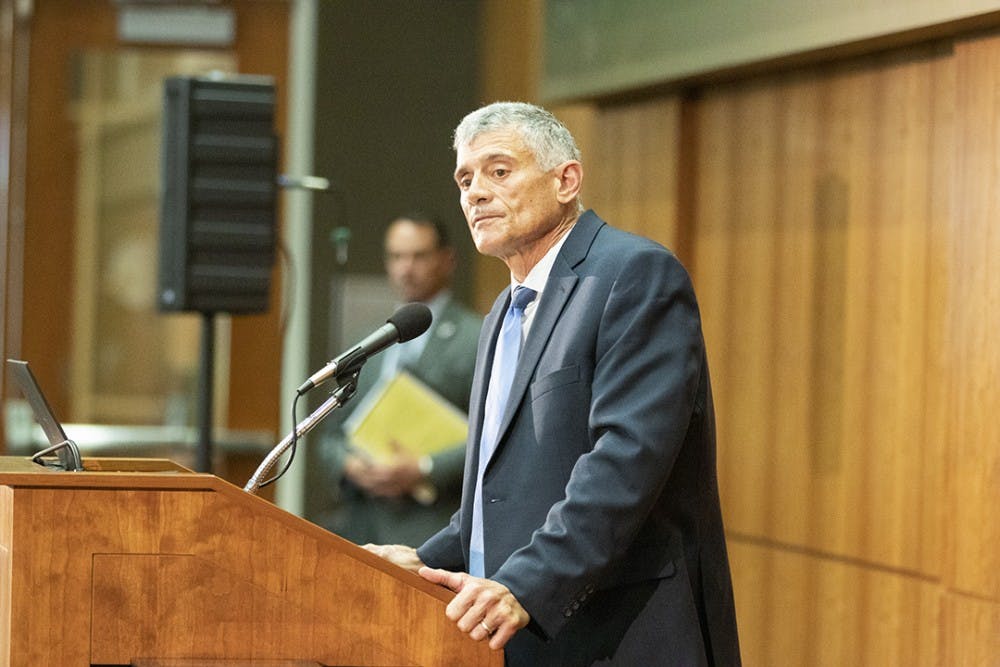Due to a state law, the Board of Trustees has been forced to postpone its deciding vote on USC presidential candidate Gen. Robert L. Caslen.
Judge Robert Hood placed a temporary injunction on the meeting scheduled for Friday. The law states Board of Trustees members must have a written and verbal communication five days prior to a meeting. Members were notified Tuesday morning, three days prior to the meeting.
Jeff Stensland, USC director of public relations, confirmed the vote has been called off.
"It has been canceled in light of questions raised regarding state law requirements for notice to board members," Stensland said.
Stensland said there is no update on a possible rescheduling of a meeting.
Two simultaneous meetings were held this afternoon at 2 p.m. prior to the vote cancellation. One was a press conference at the Statehouse led by Columbia Mayor Steve Benjamin and the other was an emergency faculty senate meeting held on campus.
Both meetings questioned McMaster’s actions and asked the Board of Trustees to refrain from voting this Friday.
Benjamin referenced this breach of state law in his speech during the press conference, calling McMaster's decision "an inappropriate and unprecedented process that does not take in account the stakeholders in our university."
Prior to the injunction, Benjamin called for the Board of Trustees to cancel its vote and start a new and transparent presidential search moving forward. Benjamin asked board members to listen to students, faculty and community members.
Sen. Darrell Jackson also spoke at the press conference alongside Benjamin and called McMaster’s move was “egregious.” He said if the vote was followed through, he would have challenged it through the SC House Oversight Committee legally.
Jackson also had a message for Caslen, urging him to only accept the presidential job through the Board of Trustees’ bylaws.
“I don’t see how you could, in good conscience, come to a state and to a university where members of the general assembly are adamantly opposed to the process that is selecting you,” Jackson said.
On the other side of the street, the USC faculty senate passed two resolutions in opposition of Caslen’s candidacy as president of the university.
The first, motioned by Bethany Bell, an associate professor in the College of Social Work and chair of the faculty welfare committee, criticized the state of the presidential search and said it has turned into a partisan operation.
“Faculty have been jaded for so long because we really have not had a true governance process, but I hope this is changing people’s opinions,” Bell said.
The second was a vote of no confidence against Caslen as a candidate for the presidency, motioned by Simon Tarr, a faculty senator and media arts professor.
“My main concern is that good university governance be followed, and that’s the most important thing that any Board of Trustees does,” Tarr said.
Both resolutions were passed without any dissent and were met with applause from the faculty senate and spectators. Although both were passed, the resolutions from the faculty senate have no official power and are largely symbolic.
The meeting lasted for over an hour and was attended by over one hundred spectators and faculty members, who were able to voice their concerns directly to the senate. Attendees such as adjunct professor Clare Morris expressed discouragement at the state of the presidential search and the role of faculty in the decision.
“I just think it's important for it to be on the part of the university and not outside influences,” Morris said, referring to McMaster’s call for a vote.
Other faculty members were confused about the search and why the governor was involved.
“We're risking, possibly, our accreditation, we're risking our national reputation and we're risking the trust of our students for a candidate who came to campus and didn’t show us much,” Samuel Amadon, an associate professor in the English department, said.

